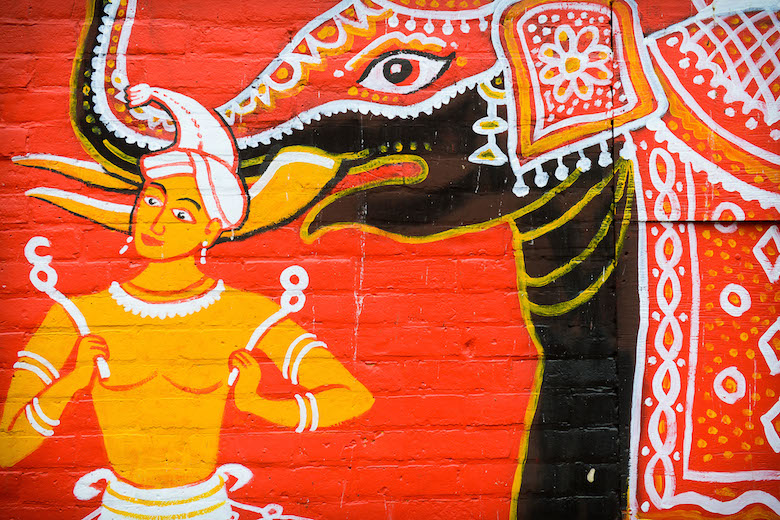
Above the glass rack in the dining room of Lakruwana in Staten Island hangs a long piece of wood with the following words burned into it: “Now you are in a world of your own.”
Or, perhaps, the compelling world of Lakruwana Wijesinghe, 55, one that the Sri Lankan restaurateur created by hand. There are thousands and thousands of pinkish cabo stones imported from Sri Lanka set into the walls and framed by long sticks of bamboo; woven twig placemats set atop thick teak tables; regal, tall-backed wrought-iron chairs with woven-twine backs; clay masks, pots and spears that hang on the walls along with grand statues of Siddhartha, temple guards and the smaller, demure Buddhas that are perched below.
Each and every elaborate detail sourced and brought back from the Isle of Gems to remind Wijesinghe of the Sri Lankan homeland he left in 1985.
Even more dazzling than the elaborate interior (an unlikely setting in this hardscrabble Tompkinsville neighborhood, especially when viewed from the street outside where a cordoned-off bathtub-size pothole has sat unfilled for the better part of a year and around which a bus gracelessly rumbles to a stop every half hour) are the dishes prepared by Wijesinghe’s chef wife, Jayantha.

Spicy, bright curries are swathed in coconut milk; heady flavors of tamarind, cardamom, cinnamon and chili power are slowly simmered into sauces to mix with fragrant rice and spooned into traditional golden brown “string hoppers” made from rice flour and shaped like a trifecta of cereal bowls. Mulligatawny soup, Sri Lankan–style in its bright-green hue (which is culled from the curry leaves at its base), is spicy enough to make you break a sweat, but softened with coconut milk to keep you spooning. And then the lamprie, a banana leaf-wrapped adventure filled with rice and, atop it, dainty piles of caramelized onions, tender eggplant, cashews, cubes of jack fruit and, if you like, simmered spicy lamb or chicken.
Lakruwana is one of about a half dozen Sri Lankan restaurants on Staten Island, the borough that became an odd little outpost for immigrants from this island nation escaping its civil war in the 1980s. But then again, maybe not so odd: Not only does it remain one of New York’s last affordable enclaves, like Sri Lanka the island of Staten also can count the Dutch as part of its early influential heritage. And both islands are overshadowed by their larger island neighbors — India and Manhattan each being the more common reference points that cast long shadows.

The neighborhoods of St. George and Tompkinsville are now home to over 5,000 Sri Lankans — the third largest enclave outside the country itself. Wijesinghe came from the capital of Colombo, meeting his wife, a fellow Sri Lankan expat, a few short years after arriving while riding on the fabled Staten Island Ferry. The two married and started a spice businesses to bring in the flavors and aromas they missed so much from home.
They opened the city’s first Sri Lankan restaurant in Manhattan two years later in 1993, a tiny spot on 42nd and 8th Avenue, but with a six-flight walk-up that only the most homesick or curious would endure. In 1995, they moved a couple of blocks away to a better location, where they stayed for nine years. But high rent and the desire to be near their home community sent the Wijesinghes to a spot in St. George that had been vacated by a French restaurant that flopped in the diverse, often working class area.
Three years ago, they moved one last time, a mile and change down Bay Street to Tompkinsville, although the increased distance doesn’t seem to deter its fans from both near and afar. One weekday afternoon, two men in their 20s sat contemplating the ample hoppers that sat in front of them, as a sarong-clad Lakruwana filled their fired-clay water cups to the brim.
“My friend is traveling to Southeast Asia, and I thought it would be great if we came here before he left,” one said, explaining to the owner that he’d traveled all the way from Manhattan to show his departing buddy one of his favorite spots.
“I love the hoppers!” he exclaimed.
“Thank you,” Lakruwana nodded with a shy smile and a bob of his head, and a quiet, quick departure to the kitchen. With that, the two men dug into the dish — the crisp crack of a hopper followed by the sounds of clanking forks and spoons, relishing in a moment this world of their own.



